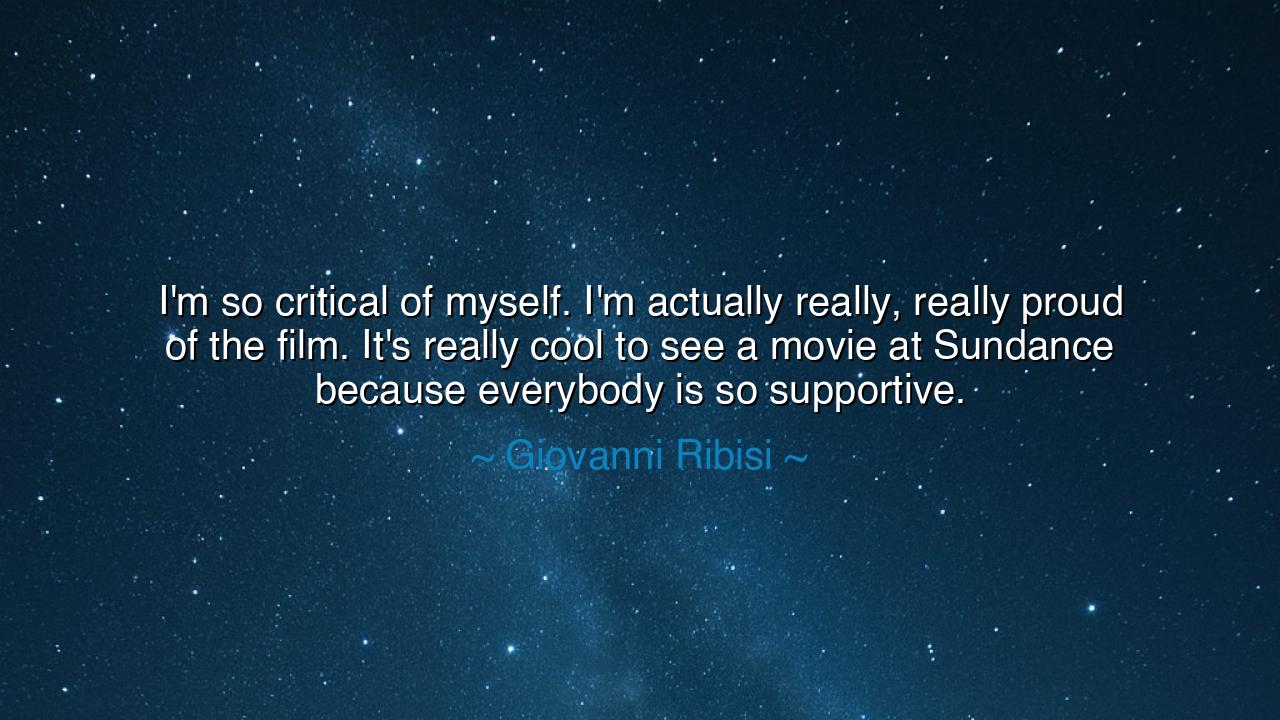
I'm so critical of myself. I'm actually really, really proud of
I'm so critical of myself. I'm actually really, really proud of the film. It's really cool to see a movie at Sundance because everybody is so supportive.






On the Balance Between Self-Criticism and Self-Respect
When Giovanni Ribisi spoke the words, “I’m so critical of myself. I’m actually really, really proud of the film. It’s really cool to see a movie at Sundance because everybody is so supportive,” he was not merely describing his experience as an artist — he was expressing an ancient and noble struggle: the tension between self-doubt and self-worth. His words echo the voice of countless creators, thinkers, and dreamers who have wrestled with the same paradox — to strive for perfection, yet to find peace in imperfection. For to be critical of oneself is the mark of one who truly cares about their craft; but to also be proud of what one has achieved is the mark of wisdom and maturity.
To be self-critical is a gift and a burden. It drives one to excellence, to refine one’s art, to reach for heights unseen. Yet, as the ancients knew, the sword of perfection cuts both ways. It sharpens skill, but it can also wound the soul if wielded without compassion. The artist who demands too much from himself becomes a prisoner of his own expectations, forever seeing flaws where others see beauty. Ribisi’s confession — “I’m so critical of myself” — reveals a heart that longs for mastery, yet understands the need to temper discipline with grace. For even the most skilled craftsman must learn, at last, to rest and say: “This is good.”
In saying he is proud of the film, Ribisi demonstrates that rare balance between humility and celebration. Pride, when born from honest effort and integrity, is not vanity — it is acknowledgment of truth. It is the soul’s way of recognizing that its labor has borne fruit. The ancients called this eudaimonia, the flourishing of the spirit that comes from aligning one’s actions with one’s purpose. The wise man does not boast, yet he does not hide his light under a bushel. He honors his own work, knowing that by doing so, he honors the divine spark that made the work possible.
And when Ribisi speaks of Sundance, of an audience “so supportive,” he touches upon another timeless truth: that art, and indeed all human endeavor, blossoms best in an environment of encouragement. Even the strongest tree needs fertile soil; even the greatest mind thrives when met with kindness. At Sundance, artists gather not to compete in bitterness, but to celebrate creation itself — to share, to inspire, to heal. It is a rare and sacred space where the critic within can fall silent, and the heart can breathe freely in the warmth of shared humanity.
Consider the tale of Michelangelo, who toiled for years upon the ceiling of the Sistine Chapel. He was relentless, tormented by his own pursuit of perfection. He once wrote, “I am not a painter.” Yet when the work was unveiled, the world stood in awe. Even he, in that moment, must have felt a quiet pride beneath his exhaustion — a flicker of joy that his suffering had created something eternal. Like Ribisi, he was critical, yet his greatness lay not in the criticism itself, but in his ability to rise beyond it, to let the work speak louder than his self-doubt.
The wisdom of Ribisi’s reflection is this: a soul must learn to hold both striving and stillness. One must labor with diligence, yet celebrate with gratitude. To be endlessly self-critical is to miss the beauty of the moment; to be blind to one’s flaws is to cease growing. True mastery lies in harmony — the ability to refine without despair, to improve without self-condemnation, to take joy in what has been achieved while still reaching for more.
The lesson, then, is simple but profound: be patient with yourself. Work with care, but also with kindness. When you create, pour your heart into it — and when the work is done, allow yourself to be proud. Surround yourself, as Ribisi did, with those who uplift rather than belittle, for support is the sunlight of the spirit. Remember that growth does not come from endless dissatisfaction, but from the steady rhythm of effort, reflection, and renewal.
And so, as you walk the path of creation — whether in art, in love, or in life — carry both humility and pride in your heart. Let self-criticism be your compass, but let self-respect be your anchor. For in the end, it is not perfection that defines a life well-lived, but the courage to create, to share, and to stand — proudly, yet gently — among those who cheer you on.






AAdministratorAdministrator
Welcome, honored guests. Please leave a comment, we will respond soon